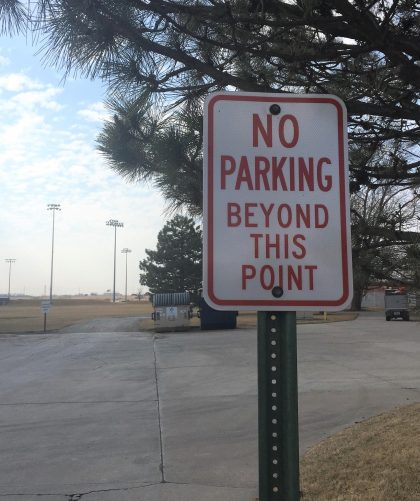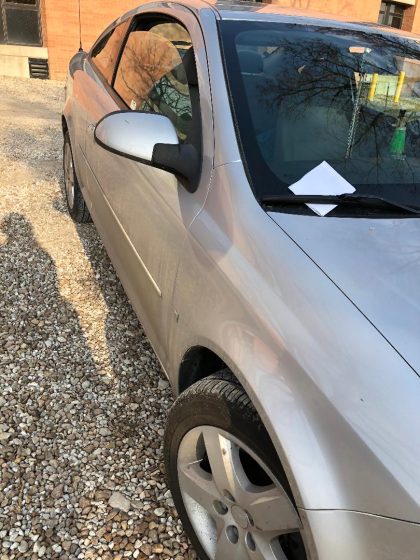Why are they called fines when they don’t make you feel fine?
By Jasmine Pankratz – Horizon Sports Editor
If you go to Hesston College for two years and come away without a fine, let me tip my hat to you and give you a round of applause. Because the search for finding a HC student who hasn’t at least had a fine warning is almost as hard as following all the fine rules.
Now you might say, “That’s not true, I’ve followed all the rules; maybe if everyone did they wouldn’t get fined.” I hate to be the one to say it, but you’re lying to yourself. You’ve broken one of these rules; you’ve just never been caught.

For those of you who don’t know, there are two kinds of fines: Fines for failing to adhere to residence policies and fines for breaking campus facilities policies, mostly related to vehicle registration and parking.
I received my first fine a couple weeks ago for a parking violation from campus facilities and began doing a little digging to find out who came up with these fines in the first place. The full list of rules can be found online in the student handbook.
Receiving my fine sparked some curiosity (partly out of anger), so I went to Juli Winter, Dean of Students, to get some answers. I found that my parking violation and all other vehicle related incidents are actually entirely separate from other campus life-related fines.
However, I still felt I owed it to my fellow rule-breakers to get more answers about those fines, which you can find listed here in the student handbook.
JP: Who creates the fine amounts?
JW: “The fines have probably been there for over 40 years. I’m sure they were developed within the Student Life Department at that time. They have been increased maybe once in the last 10-15 years. A new one was added four years ago, regarding riding scooters inside the building.”
(In other words, we have no one to blame for creating these fines.)

JP: Why were they created?
JW: “I would say that the reason fines are there is to act as a deterrent. It comes down to personal safety and respect of the community, and some of the fines also have to do with college liability.”
(I guess I did feel a little guilty when they told me my car could’ve been a problem if a student needed an ambulance.)
JP: Do we have records of how much we make from fines in a year?
JW: “We do have that data but we don’t really keep it in a spreadsheet since it doesn’t go into the actual budget. Majority of the fines are for open house hour violations and failure to meet chapel requirements. The highest individual fine amounts are confidential information.”
(But Juli was nice enough to go back through and calculate the fines from last semester – and we averaged 23/month. Multiplied by $25, the cheapest fine to receive, that’s $575/month.)
JP: What happens to all the money from fines?
JW: “It goes into a fund called the student disciplinary fund and then that money goes towards things for students. This could be things in the dorms that students have asked for or it could be helping a student with medical expenses if our student emergency fund is depleted.”
The new TVs that KC got in their lounges this year came out of the student disciplinary fund. So I guess it’s not like the college is relying on fines to pay someone’s tuition.
JP: What are your thoughts about the rumor regarding the college being dependent on fines as a portion of our income?
JW: “The fund does not go into paying anyone’s salary or paying bills. It might look differently to students, but we don’t take peoples money just to take their money. We would love it if we didn’t have students earning fines. It would mean they were making good choices within our community.”
(It’s getting harder to be upset about this whole fine situation.)
JP: Has there ever been any conversation regarding fine alternatives, due to angry phone calls or feedback?
JW: “The reality is money talks for kids but at times we have done community service and things like that but it doesn’t always have the same effect as fines.”
(Well, I don’t know. I think I’d be just as upset having to spend a few hours picking up trash because I burned a candle in my room.)
JP: Do you believe fines are effective?
JW: “For the most part the fines have been effective. There will always be students that they’re not effective for.”
(I know after I received mine I didn’t want to park my car there anymore…)
JP: At what level do the fines become the police department’s responsibility?
JW: “Our disciplinary system is separate from the police department’s. The majority of our fines have nothing to do with them and visa versa. The police do share with us anytime they have contact with any of our students, even if it’s speeding or headlight out; I get a report. We don’t do anything with that type of information but their purpose is just to keep us informed on our community. If a student is choosing to engage in illegal behaviors, they could earn consequences from both us and the police.”
In conclusion, my fellow classmates, I’d like to encourage you to be more respectful when it comes to fines. The college really does have our best interests at heart even if you assume they’re only taking our money to ruin our lives.
But hey, if you get caught and get a fine, so what? It might actually be a good thing. We’re always complaining about the bad food, tiny beds, gross furniture, and I’m sure you can think of a few other things. However, upgrading things costs money. So don’t go looking for trouble, but if you get a fine, don’t think of it as such a bad thing. Just remember that as you’re paying your fine, you’re really making Hesston College better for the next group of rebels that comes to town.
“For the most part the fines have been effective. There will always be students that they’re not effective for.”
I know after I received mine I didn’t want to park my car there anymore…
At what level do the fines become the police department’s responsibility?
“Our disciplinary system is separate from the police department’s. The majority of our fines have nothing to do with them and visa versa. The police do share with us anytime they have contact with any of our students, even if it’s speeding or headlight out; I get a report. We don’t do anything with that type of information but their purpose is just to keep us informed on our community. If a student is choosing to engage in illegal behaviors, they could earn consequences from both us and the police.”
In conclusion, my fellow classmates, I’d like to encourage you to be more respectful when it comes to fines. The college really does have our best interests at heart even if you assume they’re only taking our money to ruin our lives.


